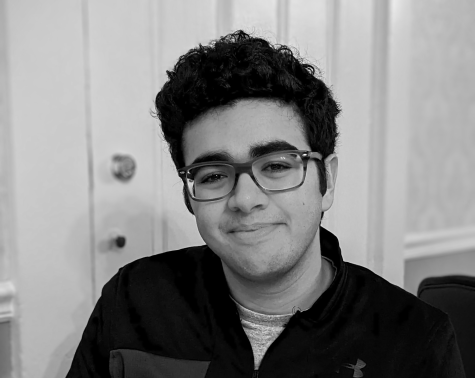West school counselors, psychologists give advice about maintaining wellness during COVID-19 quarantine
March 13, 2020 is a day we will all remember. It was the day the lives of Glenbard students and faculty abruptly changed course, the day COVID-19 caused our schools to shut down. In the ensuing days, all of Illinois followed. Soon, schools and workplaces nationwide would close their doors.
The pandemic has impacted everyone in many ways. Ms. Culloton, West school counselor, says, “It would be hard to find a student who hasn’t been affected […] because it’s so unusual. We’re people who are used to structure and we lost a lot of that […] in this time so I think it’s […] been a struggle for everyone, even the adults.”
Lockdown and social distancing procedures have changed our lifestyles in many ways. Mr. Keely, school counselor, says, “This is something that is completely unprecedented to the students and staff. Nothing like it has ever been seen to anyone working or going to school today. Physically, students aren’t able to participate in clubs or sports or activities that they are used to or how they are used to.
“Emotionally, it has been a rollercoaster for everyone. The fear of the unknown is a very difficult thing for many to face, and this pandemic has cast that fear on many individuals. Academically it is tough on student[s], families and teachers. Students and teachers are now forced to do everything remotely in [the] confines of their own homes.”
Several challenges have arisen as a result of lockdown. According to Ms. Meyer, school psychologist, “Routines and predictability are extremely important for students and those things have completely and rapidly shifted in the past few months” and “students have been met with the challenge to re-establish how they achieve personal wellness in the areas of physical, emotional, and intellectual functioning, which is much easier said than done.”
Ms. Rubino, school counselor, says, “Kids can very easily feel lazy or just not feel motivated. […] I think it’s important for you [to] get out, get up in the morning, […] shower, change your clothes […] just like you would a normal school day, like get out of your pajamas, you know, create a space where you can get your work done.”
Mr. Poll, school psychologist, says, “[W]e tend to find motivation, purpose, and a sense of accomplishment through establishing routines.”
Mr. Neberz, school counselor, affirms this, saying, “[K]eeping a schedule and maintaining the discipline that comes with our everyday responsibilities is paramount. Our bodies also need regularity in sleep, eating and exercise to stay healthy, not something we want to sacrifice in the middle of a pandemic.”
Mr. Skowronski, physical education teacher, agrees “WE ALL need a routine. We need a plan when we wake up in the morning and moving/doing things with a purpose. Waking up late and then lying around serves no purpose.”
Everybody’s routine can be different and tailored to our individual abilities. However, Ms. Meyer advises, “[F]irst and foremost, students need to make sure their basic physical needs are being met. Things like getting enough sleep, getting outside when possible, making time to relax, limiting screen time, participating in regular physical activity, eating healthy and drinking enough water are fundamental. If we don’t feel well physically we will struggle to do anything else effectively.” Making sure our physical needs are met is paramount.
Mr. Skowronski adds, “Exercise! We all know the importance of exercise. The PE Department has ALWAYS pushed the importance of exercise on our students and NOW is more important than ever to get out and do something every day.”
Mr. Keely concurs, saying “[his] biggest fear is that students are isolating themselves in their rooms. Make sure to get out and about. Now that the weather is nice, go for a walk, run a hike. GET OUTSIDE.”
Ms. Culloton agrees saying, “There’s a lot of value in getting out of the house.” Ms. Rubino also says “staying at home sitting on a couch, you know, playing video games, you know, all that time in front of […] the screen is so draining and exhausting so, you know, a little bit of exercise goals a long way. It, you know, releases endorphins and makes you happier.”
Beyond our physical condition, we should also try to be productive. Mr. Poll says, “[T]here is no item too small to add to your to-do list. Students should remember to maintain reasonable expectations for themselves. We are typically only capable of 20 to 30 minutes of undistracted work at a time. Reward 25 minutes of work with 5 minutes of relaxation time. Enjoy guilt-free free-time by completing your responsibilities first and rewarding yourself with phone, TV, or videogame time once all work is finished.”
Another need we can easily forget is the need to socialize. Mr Neberz said, “Negative circumstances are the worst when experienced alone. Seclusion and quarantine only makes those feelings more difficult to handle, but connecting with those around us and using our friends and family for support is suitable medicine.” Although physically socializing is dangerous and not recommended, virtually connecting with others is a great way to remedy some effects of isolation.
It is also important to focus on the positives of lockdown. According to Mr. Poll, “Students may have more time, freedom, sleep, access to home cooked meals, family time, and potentially less responsibilities than ever before.”
Ms. Rubino says, “I think a lot of kids, you know, feel like they they miss their friends, they don’t understand why they can’t see their friends, you know, and so I think it’s healthy to talk about it, but I also think that this has been a time where families are able to eat dinner together in the evenings where they may not have been able to have that time in the past and families are doing more activities together, so I think as a result people are gonna you know, really appreciate quality time.”
Mr. Keely says, “I know that I enjoy cooking. For a lot of people, this stay at home order gave them time to take on tasks that maybe they weren’t used to doing. Cooking at home, trying new recipes or healthier alternatives to your favorite foods is a great start.”
Unfortunately, many of us feel the myriad of negative effects of quarantine. Mr. Poll says, “For some students, this time has resulted in social isolation, unhealthy habits, financial loss, physical health concerns and loss, and negative interaction with those closest to them. I would just remind everyone that this is a once in a lifetime situation we are experiencing. School is important, but if you are not in a place to complete the work, go easy on yourself, don’t judge yourself too harshly, and remain hopeful. This time will pass, meet yourself at the place you are at, aim for small, incremental successes, and try to improve and manage day by day.”
It’s important to remember, according to Ms. Meyer, “There is no shame in having a hard time – we are all having a hard time right now. Reach out to friends, family, or trusted adults. Glenbard West is here to help just call 630-942-7406 for help from counselors, school psychologists/ social workers, nurses, or deans.” There is no shortage of people willing to help.
Mr. Keely says, “I believe that there could be many negative impacts but the best thing to do is to stay positive. Many of us are in the same scenario so instead of panicking, I believe that it is important to understand that this too shall pass. As long as we take care of ourselves and our loved ones, we will all come out of this stronger.”
In conclusion, Mr. Neberz says, “Anytime individuals go through an unprecedented and uniquely traumatic experience, there are always stages that people will naturally progress through. I liken these experiences to the same feelings associated with grief or loss. We tend to focus on what we had, what we’re missing and the ‘negatives’ connected to where we are in the present. What I appreciate, though, is what I see in action from the faculty, staff, students and parents of the Glenbard West family. Action is always the equalizer and when I see students making the best of situations, continuing to investigate their future college plans and rally around the chaos happening around us, I know that everything will eventually be ‘ok.’” He asks of all of us, “Who are you? Are you the person that sulks and obsesses over the negative of a situation – the events we cannot control OR Are you the person who makes the best of the situation we’re in and finds the ‘good’ in our present moment?”
Let’s make the most of this lockdown by caring for ourselves and others in this time of uncertainty.

Ethan Parab is a senior at Glenbard West and a Tech Specialist of The Glen Bard. In addition to newspaper, he enjoys playing tennis, reading, and computer...




